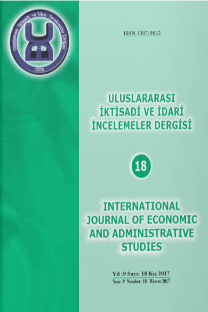BÖLGESEL KALKINMA YAKLAŞIMLARINDAKİ GELİŞMELER VE AB PERSPEKTİFİ ALTINDA TÜRKİYE’NİN BÖLGESEL POLİTİKA ANALİZİ
Küreselleşme süreci içinde bölge kavramının tanımı ve bölgesel kalkınma alanındaki yaklaşımlar önemlibir değişim yaşamıştır. Büyük ölçekli kamu ve özel sektör yatırımlarını hedef alan klasik bölgesel kalkınmayaklaşımları (merkeziyetçi) yerini “yeni yaklaşımlar”a bırakmıştır. 1980’lerden başlayıp süregelenbu yeni yaklaşımlar bölgelerin içsel potansiyellerini artırmayı hedeflemektedirler. Küreselleşme kapsamındabölgelerin entegrasyonu ve uluslar arasılaşmasıyla birlikte bölge dışı ilişkilere de daha fazla önemverilmeye başlanmıştır. Yeni yaklaşımların öneminin artmasının diğer bir nedeni de çoğu ülkede uygulananyerelleştirme politikalarıyla ilgilidir.Türkiye’de bugüne kadar uygulanan bölgesel politikalar bölgeler arasındaki gelişmişlik farklarının giderilmesindebaşarılı olamamıştır. Yeni yaklaşımlar paralelinde Türkiye’nin yeni bölge tanımları yapmasıve yerelleştirme politikaları uygulaması gerekmektedir. En önemlisi ise AB’ye üyelik sürecinde olanTürkiye, bölgesel politikalarını AB normlarına uyumlu hale getirmek zorundadır. AB’ye üyelik, aynı zamandayapısal ve uyum fonlarından yararlanabilme imkanı vereceğinden Türkiye’nin bölgesel dengesizliklerigiderme konusunda ihtiyaç duyduğu finansal desteği de sağlayacaktır.
Anahtar Kelimeler:
-
___
- Avrupa Komisyonu, (2004), Pre-Accession Assistance, http://europa.eu.int/
- comm/ enlargement/ pas/paa.htm.
- Avrupa Komisyonu İngiltere Temsilciliği, (2004), http://www.cec.org.uk/info
- / pubs/bbriefs/bb23a.htm
- Avrupa Komisyonu Türkiye Temsilciliği (1999), Gündem 2000: 1999 yılı
- Aday Ülkeler İlerleme Raporları, s.84.
- CASTELLS, M. ve HALL, P.(1994), “Technopoles of the World”, London:
- Routledge.
- DAĞ, R., (2000), “Doğu ve Güneydoğu Bölgelerinin Gelişmesi Örneğinde
- Bölgesel Kalkınma Makro Politikaları”, www.tesev.org.tr/projeler
- DAVEY, K. (1986), “A Future for Local Government”, Institute of Local
- Government Studies, University of Birmingham.
- DPT, (2000), “Bölgesel Politikalara İlişkin AB Faaliyetleri”, Ankara.
- DPT (2003), “Türkiye İçin Katılım Ortaklığı Belgesi”,
- http://ekutup.dpt.gov.tr/ ab/kob/2003.pdf
- EEB, (2003), “Structural and Cohesion Funds in the New Member States”,
- The European Environmental Bureau http://www.eeb.org/activities/enlargement/
- EEB-handbook-funding.pdf
- ERAYDIN, A. (1999), “The Roles of Central Government Policies and the
- new forms of Local Governance in the Emergence of Industrial Districts”. IGU
- Commission on Industrial Space, Haifa and Beersheva, 19-26 Haziran.
- GAP (1999), “Terms of Reference for a revision of the GAP Master Plan”.
- Ankara: GAP İdaresi.
- GARCIA-MILA, T., (1997), “Asymmetrical Decentralization: Spain. Mediterranean
- Development Forum on -Fiscal Decentralization”, Marrakesh, Mayıs 12-
- -
- Habitat II (1996), “Turkey: National Report and Plan of Action”, İstanbul,
- Uluslararası Yerel İdareler Birliği.
- HANSEN, N. (1990), “Innovative Regional Milieu, Small Firms and
- Regional Development:Evidence from Mediterranean France”. Annals of Regional
- Science 24: 107-123.
- HUMMELBRUNNER, R. ve.LUKESCH, R (2002), “Systemic Instrument
- for Regional Development”, http://www.wiram.de/toolkit/Downloads/ Systemic
- Instruments .doc
- İHD (1996), “Habitat II, İstanbul Deklarasyonu 3-14 Haziran 1996”, İnsan
- Hakları Derneği İstanbul Şubesi, http://www.ihdist.org/s/s33.asp
- ILLERIS, S., (1993), “An Inductive Theory of Regional Development”
- Papers in Regional Science, 72, (2).
- ÖZCAN,G.B.,(1999), “Local Economic Development, Decentralisation and
- Consensus Building in Turkey. Final Report of the McNamara Fellowship
- Programme”, Presented to the European Institute, London School of Economics and
- Political Science.
- RODINELLI, D.A., (2000), “Technology Development and Global
- Competitiveness: Regional Support Systems for Transnational Enterprises”, Global
- Focus, 12 (3), S.41-55.
- SHAH,A., (1988), Balance, Accountability and Responsiveness: Lessons
- about Decentralisation. Washington DC: The World Bank.
- SMITH, G., (1994), “Relationships between Democracy and Decentralisation”.
- Paper presented at the International Conference on “Democracy and Decentralisation”,
- Organized by the Friedrich Ebert Foundation and the Turkish Foundation
- for Social, Economic and Political Research, İstanbul 11-12 Şubat.
- SPAHN, P. B., (1998), “Issues of Governance in a broad context”. Paper delivered
- at the Second Mediterranean Development Forum. Marrakesh, Eylül 4-5.
- STOHR,W., (1981), “Development from below: The Bottom Up and
- Periphery-Inward Development Paradigm” in Stohr and Taylor, eds, Development
- from Above or Below? The Dialectics of Regional Planning in Developing
- Countries, London: Wiley.
- STOKER,G., (1998), “Governance as Theory: Five Propositions”
- International Social Science Journal "governance" special issue, No.155 (Mart).
- SWELL, D., (1997), “Assignment of Functions in Multicentered Systems of
- Government: The Middle East and North Africa Countries”. Paper presented at the
- Mediterranean Development Forum on “Fiscal Decentralization”, Marrakesh, Mayıs
- -14.
- TOBB (2000), “AB Bölgesel Politika ve Yapısal Fonlar. Türkiye Açısından
- Değerlendirme”, www.tobb.org.tr
- WU,C.T. ve D.F.Ip (1981), “China:Rural Development-Alternative
- Combinations of Top-Down an Bottom-up Strategies” pp. 155-82 in Development
- From Above or Below?, W.B.Stohr ve F.Taylor eds., London: Wiley.
- www.bized.ac.uk, (2004), EU Regional Policy.
- ISSN: 1307-9832
- Yayın Aralığı: Yılda 4 Sayı
- Başlangıç: 2008
- Yayıncı: Kenan ÇELİK
Sayıdaki Diğer Makaleler
ORMAN FAKÜLTELERİ SON SINIF ÖĞRENCİLERİNİN MESLEK TERCİHLERİ VE GİRİŞİMCİLİK YETENEKLERİ
Kadri AKYÜZ, Tarık GEDİK, Aytaç AYDIN, İbrahim YILDIRIM, İlker AKYÜZ
ORMAN ENDÜSTRİ SANAYİ İŞLETMELERİNDE ZAMAN YÖNETİMİ
AB’YE ÜYELİK PERSPEKTİFİNDEN ROMANYA’DA KAMU YÖ- NETİMİ REFORMLARI: YAPISAL BİR ANALİZ
OTOBÜS İŞLETMELERİNDE HİZMET KALİTESİNİN ÖLÇÜMÜ- KANDIRA GÜRKAN TURİZM ÖRNEĞİ
İŞLETMELERDE UYGULANAN MOBBİNGİN (PSİKOLOJİK ŞİDDET) ÖRGÜTSEL BAĞLILIĞA ETKİSİ
